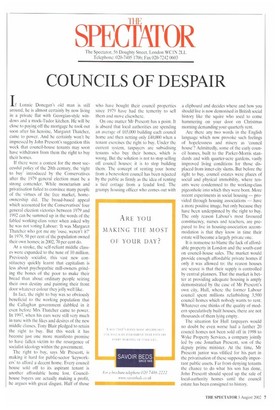COUNCILS OF DESPAIR
If Lonnie Donegan's old man is still around, he is almost certainly by now living in a private flat with Georgian-style windows and a mock-Tudor kitchen. He will be close to paying off the mortgage he took out soon after his heroine, Margaret Thatcher, came to power. And he certainly won't be impressed by John Prescott's suggestion this week that council-house tenants may soon have withdrawn from them the right to buy their homes.
If there were a contest for the most successful policy of the 20th century, the 'right to buy' introduced by the Conservatives after the 1979 general election must be a strong contender. While monetarism and privatisation failed to convince many people of the virtues of the free market, homeownership did. The broad-based appeal which accounted for the Conservatives' four general election victories between 1979 and 1992 can be summed up in the words of the fabled working-class voter when asked why he was not voting Labour: 'It was Margaret Thatcher who got me my 'ouse, weren't it?' In 1979, 50 per cent of the population owned their own homes; in 2002, 70 per cent do.
At a stroke, the self-reliant middle classes were expanded to the tune of 10 million. Previously socialist, this vast new constituency quickly learnt that capitalism is less about psychopathic mill-owners grinding the bones of the poor to make their bread than about ordinary people seizing their own destiny and painting their front door whatever colour they jolly well like.
In fact, the right to buy was so obviously beneficial to the working population that the Callaghan government dabbled in it even before Mrs Thatcher came to power. In 1997, when his ears were still very much in tune with the likes and desires of the new middle classes, Tony Blair pledged to retain the right to buy. But this week it has become just one more manifesto promise to have fallen victim to the resurgence of socialist ideology within the government.
The right to buy, says Mr Prescott, is making it hard for public-sector 'keyworkers' to afford a decent home. Every council house sold off to its aspirant tenant is another affordable home lost. Councilhouse buyers are actually making a profit, he argues with great disgust. Half of those who have bought their council properties since 1979 have had the temerity to sell them and move elsewhere.
On one matter Mr Prescott has a point. It is absurd that local authorities are spending an average of £65,000 building each council home and then netting only £40,000 when a tenant exercises the right to buy. Under the current system, taxpayers are subsidising tenants who buy their homes, which is wrong. But the solution is not to stop selling off council houses; it is to stop building them. The concept of renting your home from a benevolent council has been rejected by the public as firmly as the idea of renting a tied cottage from a feudal lord. The grumpy housing officer who comes out with a clipboard and decides where and how you should live is now demonised in British social history like the squire who used to come hammering on your door on Christmas morning demanding your quarterly rent.
Are there any two words in the English language which now provoke such feelings of hopelessness and misery as 'council house'? Admittedly, some of the early council homes, built to the Parker-Morris standards and with quarter-acre gardens, vastly improved living conditions for those displaced from inner-city slums. But before the right to buy, council estates were places of social and physical immobility, where tenants were condemned to the working-class pigeonhole into which they were born. More recent experiments in social housing — provided through housing associations — have a more positive image, but only because they have been underpinned by the right to buy. The only reason Labour's most favoured constituency, nurses and teachers, are prepared to live in housing-association accommodation is that they know in time their estate will become a largely private one.
It is nonsense to blame the lack of affordable property in London and the south-east on council-house sales. The market would provide enough affordable private homes if only it was allowed to: the reason houses are scarce is that their supply is controlled by central planners. That the market is better at providing adequate housing is amply demonstrated by the case of Mr Prescott's own city, Hull, where the former Labour council spent millions refurbishing 3,500 council homes which nobody wants to rent. Whatever one thinks of the quality of modern speculatively built houses, there are not thousands of them lying empty.
The situation for Hull taxpayers would no doubt be even worse had a further 20 council homes not been sold off in 1998 to Wyke Property Services, a company jointly led by one Jonathan Prescott, son of the deputy prime minister. At the time, Mr Prescott junior was vilified for his part in the privatisation of these supposedly important public assets. Far from denying tenants the chance to do what his son has done, John Prescott should speed up the sale of local-authority homes until the council estate has been consigned to history.


























































 Previous page
Previous page